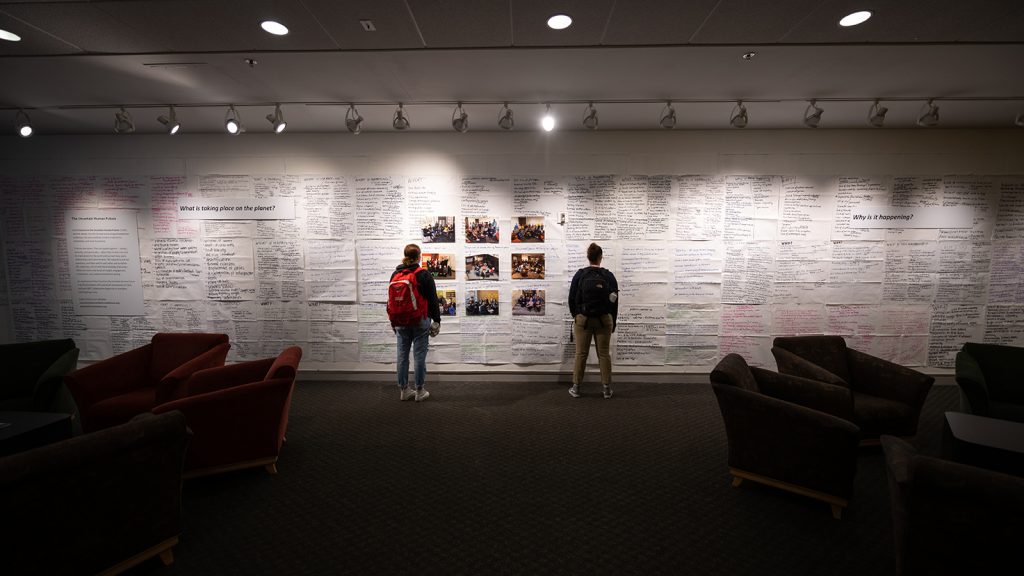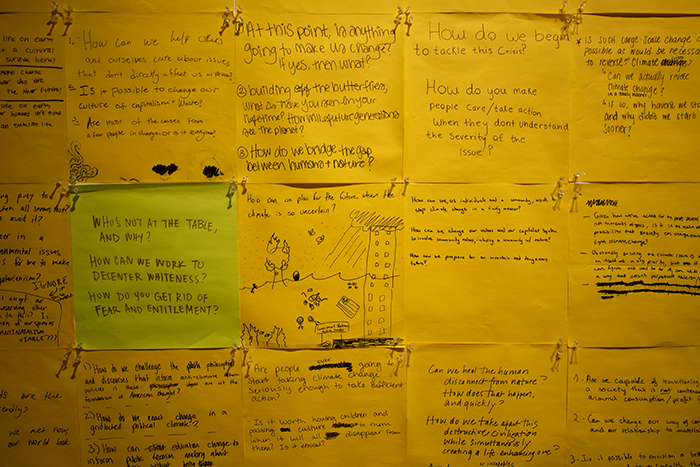Traina Center exhibit reflects on the climate crisis

What is taking place on the planet? Why is it happening? And given what we know, how do we live now?
These are some of the questions that greet visitors on the second floor of the Traina Center for the Arts at Clark University. This thought-provoking inquiry is part of a new exhibit from the Council on the Uncertain Human Future (CUHF)— an international initiative founded at Clark to encourage deep conversation on the climate crisis. It is co-sponsored with A new Earth conversation (NEC), the Clark climate initiative that grew out of the CUHF. Both projects are funded with generous support from the Christopher Reynolds Foundation.
“The Uncertain Human Future: A participatory exhibit” invites visitors to slow down, reflect, and add their own thoughts to the ideas and questions on display.
“So many of us, including a great number of faculty, staff, and students here at Clark, are looking at the truth of what’s happening, staying with it and asking what it means; I hope you can experience that through the documentation here,” says Sarah Buie, professor emerita and research scholar at Clark’s Department of Visual and Performing Arts, and founding convener of CUHF. Working with NEC Fellow Dimitri Koufis ’22, and CUHF/NEC Assistant Director Michelle Sayles, Buie curated the exhibit as another way of inviting the Clark community to join the NEC and CUHF work underway.
The walls of the exhibit are covered with handwritten materials from past CUHF Council meetings — including lists of reflections about what’s taking place on the planet, symptoms of the climate crisis, and ideas about why it’s happening. Photographs of Council groups are included, along with videos featuring Council groups and members.

After reviewing the exhibit, visitors are invited to join in and write down their own questions about the crisis and post them on a wall.
“If you start reading, you find that many people see the same phenomena, many people are asking the same kinds of questions, yet there’s such range and variety,” Buie says. “In the Council process, we share and deepen our knowledge, wisdom, and insight, and the depth of our collective concern.”
The first UHF Council was convened in 2014 by 12 women who possessed a strong commitment to the question of our human relationship to the planet. Today, the original Council members continue to work together, and many additional Council groups have convened across the nation and internationally. The practice has also become the foundation of A new Earth conversation, in which the CUHF practice is embedded into an innovative curriculum model at Clark called the “Collaborative.” The Collaboratives aim to build trust and connections in a more horizontal classroom practice, with participants exploring climate-related issues. Almost twenty different Collaboratives have been held so far in the last two years.
“We’re really looking to transform the level of awareness on campus, and the way we show up together around this issue,” Buie says.
When the Council was first founded, Buie says the goal was to break the silence around climate change. Today, as more of us acknowledge the gravity of the situation, she says the NEC offers both curricular innovations and substantial programming on the topic each semester. Other institutions now look to Clark as a model. Ellen Foley, professor of international development and social change in the International Development, Community, and Environment Department, is the lead convener of the NEC.
“If you look back on the history of A new Earth conversation, you’ll see that we’ve brought some of the most distinguished people working in this area to campus over the last four years,” Buie says.
Guest speakers have included Naomi Klein, Roy Scranton, Kathleen Dean Moore, and Susi Moser, among many others. Buie says the programming, which also has included two Climate Change Teach-ins and other campus-wide events, builds a different level of awareness in the community around what’s taking place.
“The undermining of our ecosystem has been underway for decades, but we now live in a time when the truth of our situation is inescapable — so it’s absolutely critical that at Clark, and throughout higher education, we’re present to what’s happening with our students and with each other,” Buie says.
Koufis, a geography and studio art major, became involved with the Council during his senior year of high school and decided to enroll at Clark to continue that work. Over the past two years, he has participated in various Councils with students and faculty, and recently began convening them.
As he was helping install the Traina Center exhibit, Koufis said he began to feel disheartened because there are no “silver bullet” answers to the questions and issues posed.
“The climate crisis goes far beyond CO2 levels; we are in a time of ecological, social, and economic crisis, and these are deeply intertwined. ‘Addressing’ these crises takes a broader lens than we are used to,” he says. “I hope this exhibit can give anyone engaging with the material a glimpse of the intertwined nature of the climate crisis and the opportunity for unconventional thinking in addressing any and all concerns posed in the exhibit.”
The participatory exhibit will run through the end of March.


